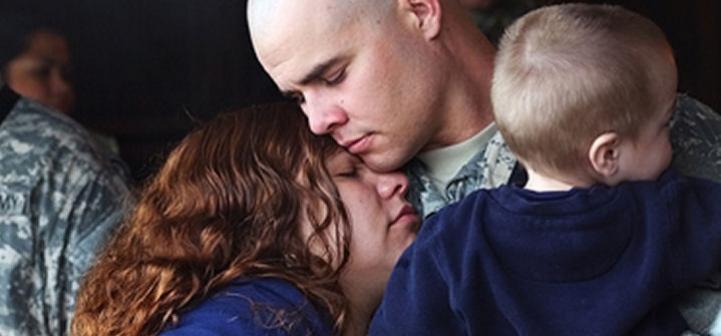
Perhaps the most disruptive, yet most common event for today’s military families is deployment. It’s easy to believe that the separation of a service member from his or her family for months at a time would be difficult for every member of the family. What may be surprising, though, is that the months leading up to deployment can be stressful, too.
The Emotional Cycle of Deployment
Those who study the psychological well-being of military families talk about five stages of the “emotional cycle of deployment” and the unique stressors that each stage creates for family members. The pre-deployment phase starts when a service member receives deployment orders, ends when he or she leaves, and can last anywhere from several weeks to several months. While every family’s experience with pre-deployment is a little different, some experiences are very common. Learning about those experiences, and thinking about their impact on young children, can help child care providers be better prepared to help children – and the whole family – cope with this difficult time.
Preparing to Leave: Parents’ Experience
Most parents who are married and living together will experience many, if not all, of the following while preparing for deployment:
Lots to do! Service members and their spouses must attend to many, many financial, legal, and other administrative affairs. (The official military deployment guide devotes no less than 27 pages to listing the various details that needed to be taken care of!) In addition, the family may need to make arrangements to ensure that the family’s needs are met while the service member is deployed, such as relocating the spouse and children to be nearer extended family. All of the decisions and preparations place a tremendous amount of strain on the adults, especially because it is in preparation for a painful separation.
Psychological distancing. As the deployment draws near, it’s very likely that the service member will be required to spend time away from the family for training and preparation for the mission with his or her unit. For the service member, this results in increased bonding with the other unit members and mental focus on the upcoming mission. Not only does the service member spend more time away from the family, but he or she also begins psychologically pulling away, even when he or she is home.
Making the most of the remaining time. On the other hand, the spouse may very well be trying to make the most out of the final weeks and days together, both relationally and practically. Spouses often make a long list of tasks and chores for the service member to accomplish around the house before he or she leaves. Spouses also want to “bank” as much emotional closeness with their service member as possible, often attempting to create “perfect” occasions as a couple or family before the long separation.
Increased conflict. Needless to say, all of these dynamics within the parents’ relationship create a tremendous amount of stress that often leads to conflict. With one parent pulling away and the other holding tighter, all while under the pressure of a mile-long “to-do” list, it’s no wonder that big arguments between couples are very common in the final weeks before departure.
Anxiety. Underlying everything for both parents is worry about what will happen once the service member is deployed. Worries about one other and the children, and about the inevitable changes that separation will cause in their relationships, can trouble both parents, and that undercurrent of anxiety about the future makes everything else that much harder.
Single parents and those who are divorced will face somewhat different, but certainly no less challenging, circumstances during pre-deployment. In fact, in many ways, their challenges are greater. In addition to preparing themselves for their departure, they must make all the necessary arrangements for alternative care for their children. Separated and divorced parents also must negotiate alternative caregiving arrangements, which can be especially trying if the relationship between parents is rocky. Whatever the situation, one thing is certain – preparing for deployment is tough!
Supporting Parents
Wise child care professionals know that they don’t care for children in a vacuum. Children are deeply affected by circumstances in their home and family, and they bring those concerns with them when they enter the doors of the child care setting. While you can’t change the circumstances themselves, you can do certain things to support parents during pre-deployment in addition to providing sensitive care for their children.
Be accepting, open, and available. Sometimes parents who are going through a difficult time are embarrassed or reluctant to talk about it with their child care provider. The first step to creating a supportive relationship is to let them know you are aware that what they are going through is normal for military families, that it is incredibly disruptive and emotionally draining, and that you are there for them if they want to talk to you. Then be sure to follow up with a “how are things going?” question every now and then.
Connect them. If feasible, help parents who are facing a deployment, especially first-timers, get connected with other experienced military or veteran families who would be a good support for them. This may be more difficult if you don’t live in a heavily military community, but reach out to veterans groups or others in the community. Of course, ask first and be respectful of their decision if they aren’t interested.
Share resources. Many wonderful information publications and websites are available to help parents know what to expect, how to cope, and what services and programs are available to help throughout the deployment cycle. A few that are especially helpful for families with young children are listed below. Don’t assume parents know about them, and don’t be shy about sharing them frequently and in a variety of ways (electronically, in your “parent library,” etc.). The resources listed below are a good place to start.
Don’t underestimate the impact your efforts can have on a military family going through the stresses of pre-deployment. A kind smile, a listening ear, and a commitment to help can be priceless.
For More Information
Be sure to read the companion article, Preparing for Deployment: Supporting Young Children, for more information on the experience from a child’s view and specific ways you can support children in the child care environment. For more ways to support children from military-connected families in child care, check out the eXtension Alliance for Better Child Care articles in the Child Care and Military Families section.
Resources
- Deployment: Keeping Relations Strong (publication from Zero to Three)
- Helping Your Child Prepare for a Parent’s Deployment (publication from Zero to Three)
- The Emotional Cycle of Deployment: Pre-Deployment (article from military.com)
- Talk, Listen, Connect (magazine for parents and caregivers from Sesame Street)
